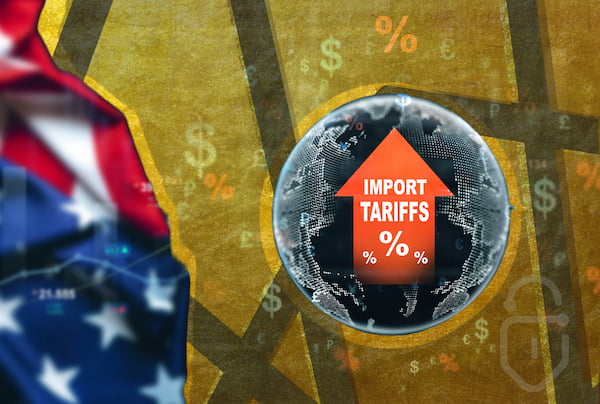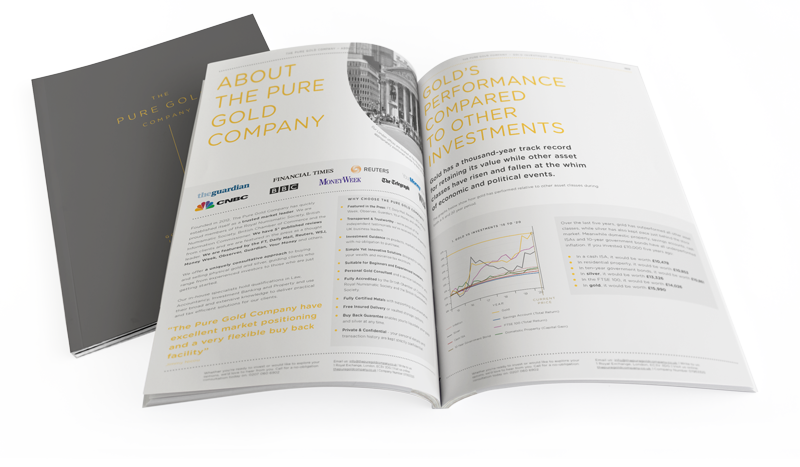What a US trade war could mean for investors and gold

Listen to article…
What do gobal trade tariffs spell out for gold?
Trade wars have far-reaching consequences, affecting everything from global supply chains to financial markets, and the US has started one. It’s hard to predict how long and severe the trade war will be, but what is very clear is that it will impact the wider global economy.
When tensions escalate, investors often seek safe-haven assets, especially gold, to hedge against uncertainty. The flight to safety, the fear of inflation, the potential for market instability and recessionary concerns could all underpin demand for gold as the trade war unfolds.
Where are we now?
The effects of a trade war on consumers can start to be felt within a few months as tariffs increase the cost of imported goods, but the full impact—such as higher prices, job losses in affected industries, and economic slowdowns—typically unfolds over a year or more, depending on the scale and duration of the trade conflict.
This is what’s happened so far:
- 25% US tariff on all steel and aluminium imports from around the world.
- 10% tariff on goods imported from China.
- 25% tariffs on near neighbours Canada and Mexico due to take effect in early April.
- Canada and Mexico have pledged to impose tariffs of their own if the US pursues its trade agenda.
- EU plans tariff on American whiskey and other products in April.
- US threatens to impose its own 200% tariff on wine, cognac and other alcohol imports from Europe.
Uncertainty fuelling instability
The tariffs imposed by the US have been characterised by significant uncertainty as announcements made one day are revoked or paused the next, reinstated a few weeks later and then paused again. There is very little certainty in all of the tariff moves so far, from US regulation to retaliatory tariffs from the affected countries.
This whiplash effect of changes to the tariff regime has already created instability in the markets. The S&P 500 has fallen almost 8% in the last month, and the NASDAQ over 10%. The market slide is being blamed squarely on the trade war as businesses and consumers face rising costs and slower growth.
What can we expect?
The trade war is only a few months old, and many of the policies are still on hold, so it’s difficult to predict their effect exactly, but there are certain trends that could be expected based on previous trade wars. For example they usually impact global currencies, particularly the US dollar which could weaken as global confidence in US economic stability declines.
They also tend to negatively impact inflation, which will be an unwelcome return for consumers and businesses who so recently lived through the worst inflation in 40 years. The rising cost of imports, and the potential decline in exports because of tit for tat tariffs, will likely squeeze supply chains and push the cost of goods up.
As the price of goods rise, businesses could also get squeezed, forced to either pass on the rising cost of goods to their customers or absorb those costs themselves, shrinking profits and limiting investment opportunities. Lower sales could lead to job losses and unemployment, all of which would affect GDP growth.
How could gold be affected by a trade war?
The economic impact of the trade war ripple effect – various shades of inflation, job losses, recession, market volatility – is likely to have an impact on consumer and investor behaviour and the value of safe-haven assets like gold. Here are some of the potential impacts:
- Gold is a both a currency and a commodity, and as such it tends to increase in value alongside the price of other goods, making it a potential hedge against inflation, one of the likely outcomes of a trade war.
- If a trade war induces a slowdown in growth, the Fed may choose to cut rates to try and stimulate growth. Low interest rates reduce the opportunity cost of holding gold (since gold doesn’t pay interest or dividends), making gold more attractive as an investment.
- As a safeguard against currency devaluation and economic instability, central banks, already major buyers of gold, could increase their stockpiles if they face trade restrictions.
- Retail investors could choose to shift some of their assets into gold to protect themselves from the potential for market volatility and inflation.
- Institutional investors may similarly choose a safe-haven strategy in anticipation of the market and economic effects of trade wars.
Why gold in a trade war?
In times of economic uncertainty, gold has consistently proven itself as a reliable safe-haven asset, and the ongoing trade war is likely to prove no exception. As tariffs increase, supply chains face disruptions and global growth slows, investors seek refuge in assets that hold intrinsic value. Unlike stocks or fiat currencies (cash), which can be severely impacted by trade disputes, gold remains resilient, largely because it is not tied to any single economy.
For investors looking to shield their wealth from the fallout of a trade war, gold offers a time-tested hedge against market volatility, currency devaluation, and inflation. As governments retaliate with tariffs and monetary policies shift in response, the uncertainty surrounding global trade only adds to gold’s attractiveness. While trade wars may come and go, the demand for gold as a store of value remains a constant, making it a crucial asset for those navigating the complexities of today’s financial landscape.

